Use Humour in Branding to Create Strong Emotional Bonds so You Increase Sales
Sorting through all the noise we’re bombarded with in the digital era is certainly a challenge. It’s essential for a brand to avoid getting lost in the daily deluge as customers navigate information overload and a visual avalanche to focus on what’s most relevant. That’s where emotional connections come in, solving a digital age dilemma by using humour in branding as the delivery vehicle[1].

Strong content will stop consumers skipping adverts, according to a study conducted by Millward Brown as reported in Marketing Week[2], which reveals the top five reasons someone will watch. These are:
1) An advert is funny
2) It is for a category the recipient is interested in
3) There is a reward, such as coupon or points
4) The advert is for a brand the consumer is interested in
5) Something noteworthy happens in the first few seconds
Consumer research from Adobe and Edelman Berland indicates that humour is best for product recall according to 7 out of 10 respondents. [3]
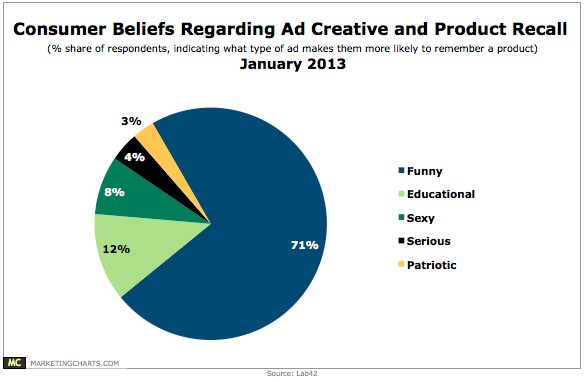
Top Five Benefits of Emotionally Driven Humour in Branding
Research tells us that when customers feel a genuine emotional connection with a particular brand, they generate disproportionate value for that brand. Those who are ‘fully connected’ emotionally are 52% more valuable to brands than customers who are ‘highly satisfied’, reports Harvard Business Review. [4]
Five benefits of emotional branding, especially humour, are:
- Differentiation
- Storytelling
- Personalization
- Relationship
- Loyalty
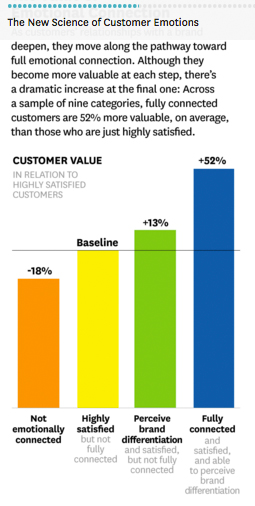
Image via Harvard Business Review
1. Differentiation Through Humour in Branding
Of course, some brands have it easier by their very nature. But it isn’t necessary to be Disney or Ben & Jerry’s to find a deeply personal, possibly humourous, way to present for that all-important emotional bond. Indeed, it’s the all-important way that Disney can differentiate themselves from Universal Studios Hollywood or Legoland and Ben & Jerry’s can inform their strategic direction based on differences from the likes of Häagen Dazs. Humour also amplifies your brand’s personality, giving it more character and life which enables it to standout more strongly and consequently attract your ideal audience.
Read more about how to make your brand standout here: Personality Matters, Bringing Your Brand to Life to Grow Your Profits
2. Storytelling Through Humour in Branding
In the automobile world, for example, it could be a desire to appear flashy, a have a sense of freedom, or the express wish to transport the children safely. Alternatively, Volvo suggests it could be the wish to “Live Fully Now.” While this advertisement’s humour is not the belly laugh type, it’s impossible not to smile as Volvo holds up a mirror to tell the story of each of us (personalization is at work here, as well).
Watch as Volvo evolves from their earlier hard sell and deadly serious car crash commercials emphasizing their steel cage design, to now endeavouring to make a successful emotional connection in the 2017 video,” The Get Away Car,” imploring us to “Live Fully Now.”
Learn how to use storytelling to increase your sales here: Brand Stories, 5 Compelling Examples That Sell Themselves
3. Personalization Through Humour in Branding
Nobody is better at personalization than Amazon, who are acutely aware of any product you search on the web, and quick to pass you pop-up banner ads and emails to let you know that they know. But small brands without the sophisticated big data collection of Amazon can accomplish personalization — with humour — as well.
Read more about delivering customer expectations here: Brand Promises, How to Craft, Articulate and Live Them for Brand Success
Victor Pest makes mousetraps and is a supplier of rodent control supplies — not very sexy as products go. A Victor rodent trap will never make an appropriate birthday or Valentine’s Day purchase, nor anybody’s Christmas wish list.
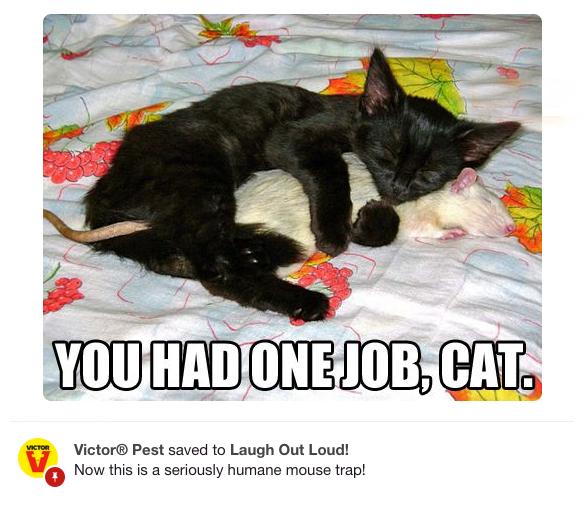
Image via Victor® Pest
They’ve used Twitter and Pinterest as channels for a humorous tone of voice directed at likely customer audiences: home builders, decorators, realtors, property management, home inspectors, exterminators, DIY shop owners, etc. The result goes way beyond what one might expect from a pest repellent company to create top-of-mind-awareness branding for an unsavoury problem.

Join our ‘How to Build Your Brand’ programme here
4. Relationship Building with Humour in Branding
“Hello, I’m a Mac. And I’m a PC” was aired by Apple from 2006 to 2009. What’s the key to this classic ad? Making your own brand the butt of the joke. When you give your brand a frivolous name (Ex: Macintosh, Dunkin’ Donuts, I Can’t Believe It’s Not Butter), it’s a head start.
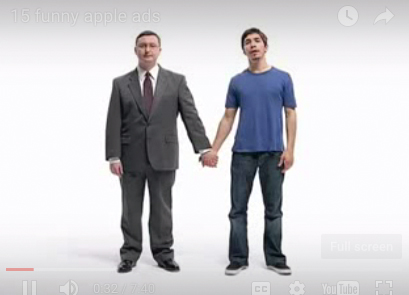
Image via Apple
Building your customer relationships using other types of humorous treatment for your brand include:
- Video commercial. Has there ever been a better example of that first 30-second Old Spice commercial featuring actor Isaiah Mustafa as “The Man Your Man Could Smell Like”? The “wildly smug, cool-cat smooth dude persona” introduced in 2010 maintained eye contact with the camera throughout, creating a connection between audience and Old Spice Man, reaping awards and more than 53 million views by January, 2017.
Old Spice – we have used often, but here it is again because it’s one of the best!
- Print ad. Proving that a picture is worth 1,000 words, Rowenta 2100 Watt Vacuum Cleaner does just that with one image. It connects perfectly with an outdoorsy audience who we imagine must be looking after heritage country estates that require lots of dust busting.
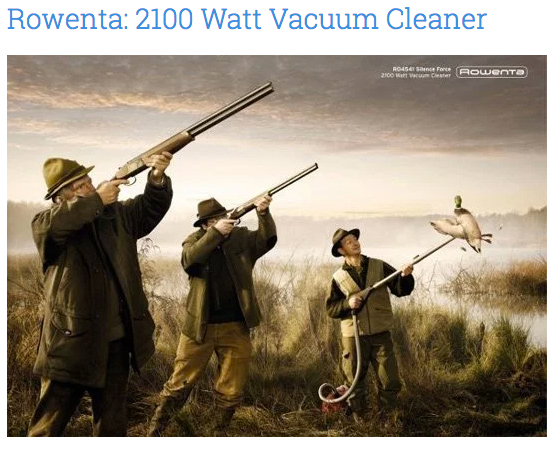
- Jingle and lyrics. “The Meow Mix Theme” was created in 1970 and performed by a dubbed singing cat using subtitles and a bouncing ball on the lyrics. Simple and memorable, “Tastes so good, cats ask for it by name” is considered an advertising classic that cat owners adore.
Learn more about standing out here: How to Use Brand Positioning to Build Brand Impact in an Overcrowded Market
5. Loyalty Created Through Humour in Branding
No matter what size, service, or product, any business can find an emotional connection that creates brand loyalty. Add in a dash of humour for a winning formula with stickiness for loyalty.
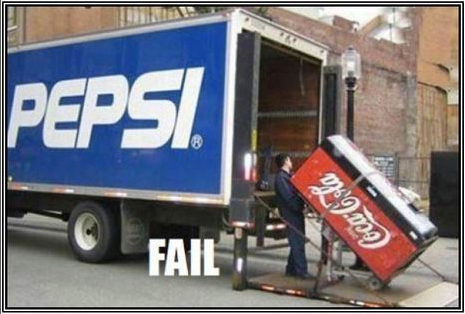
Talk about loyalty…Some of the best-known advertising icons, Poppin’ Fresh Pillsbury Doughboy (1965) and the Morton Salt Girl (1914) are still hard at work through generations of loyal customers.
More than a century later, Morton’s girl is now seen on bus stop shelters to encouraging selfies.
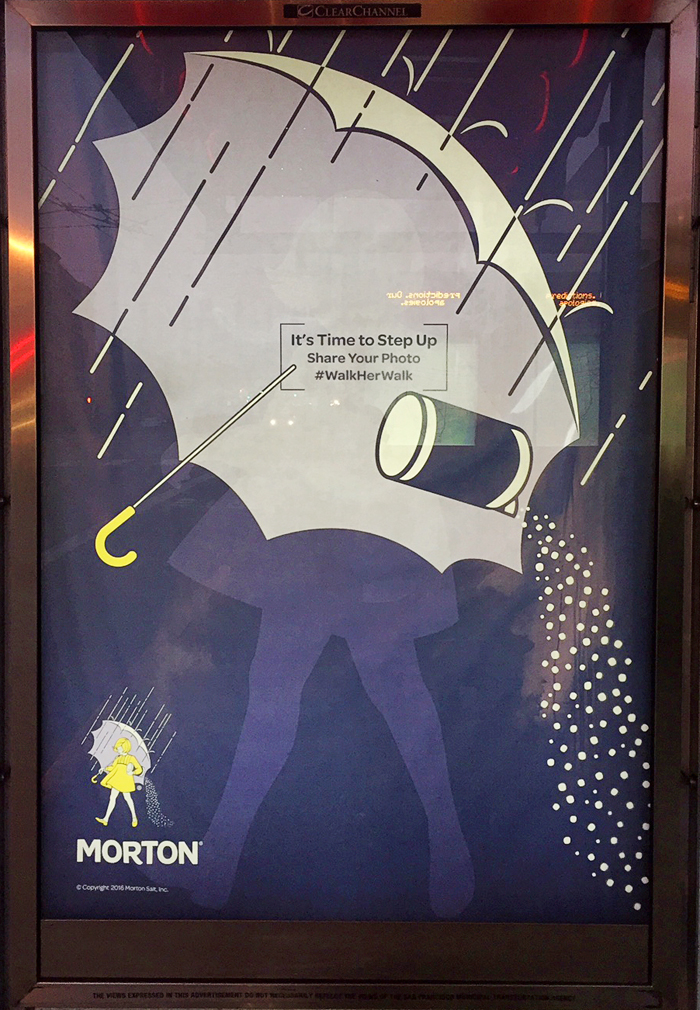
Even a contemporary supply chain software called Kinaxis has found a path for humour, using actors as characters who display their benefits as a service (Simplicity, Flexibility, Easy Upgrades, etc.) in a dating series of videos; have a look.
High tech startup brands don’t expect decades of loyalty in a single ad campaign, but they are looking for swift and sticky traction — translated as loyalty in 21st century lingo.
“Customers define themselves through brands they use. The branded clothes they wear, the cars they drive, the drinks they consume, university they attended, favourite spots to hang out, and so on.”
– Nyimpini Mabunda, Smirnoff Vodka Marketing Manager: “Emotional Branding In a Changing Marketplace”.
Redefine Your Ideal Target Audiences
Remember, there’s a risk with being brilliantly clever and funny. That is, there’s nothing worse than humour that strikes out. To make sure you’re addressing the right humour to an audience to appreciate it, a brand audit is the best way to ensure that your branding reaches the right audience(s). It’s also important to ensure you have your ideal audience fully identified and mapped out in detail. Purchaser Personas or customer pen portraits are an essential tool to ensure you get this right.
“One of the major keys to a successful humorous campaign is variety, once a commercial starts to wear out there’s no saving it without some variation on the concept…while making the customer laugh, they have to keep things interesting, because old jokes die along with their products”.
– Mark Levit, Managing Partner of Partners & Levit Advertising and professor of marketing at New York University.
If you need direction and support giving your brand a health check feel free to get in touch [email protected] or give us a ring T: +353 1 8322724 (GMT hours). Alternatively you can also give your brand a health check yourself to identify its strengths, weakness and areas for potential innovation and growth using our Auditing Analysis Accelerator™ programme. This is a step-by-step walk through, complete with downloads, questionnaires and checklists, to help you audit your brand. You can watch a section of the programme here.

Give your brand a health check here so you become more profitable
Why Humour in Branding Works Best for Sharing and Word-of-Mouth
Your fans and followers on social media provide one of the best ways to get a targeted expanded audience, that is, their friends with look-alike habits, likes, tastes, budgets. When you deliver humorous content, you significantly increase the chances that your fans will share your message.[5]
Don’t Take Your Own Brand Too Seriously
In summary,
- Even mundane products like bathroom tissue, computer hardware, and home owners’ insurance can come to life through the use of humour.
- Bring a smile to their faces — it’s a small gift — it doesn’t have to be a huge guffaw.
- Aim for hearts over wallets, the heads will follow — remember you must move the heart first if you want to win the mind
“When a brand shows that it doesn’t always take itself too seriously, it’s a powerful way to demonstrate authenticity and confidence, as well as connect with your community.”
– Tim Washer, standup comedian, Webby-nominated video producer and corporate humorist; creator of Cisco’s “The Perfect Gift for Valentine’s Day” video for the $80,000 ASR 9000 router.
Here’s one of our all-time favorites from Blendtec to inspire you to think outside the box when creating humorous content.
Questions for Brand Owners, Managers and Entrepreneurs About Using Humour in Branding
1. Does your brand lend itself to humour across customers, staff, and stakeholders?
2. How well do you know your customer base? When did you last conduct a brand audit of your customers?
3. Have you clearly identified your prime target audiences beyond your immediate base? Have you mapped out your different customer types with your Purchaser Personas™ so you can attract your ideal audience more effectively?
4. When was the last time you conducted a comprehensive health check of your brand?
5. Will a tasteful, humorous approach fit with your brand promise and your audience(s)?
Want to make your brand more successful or launch a new one? Find out how you can here.
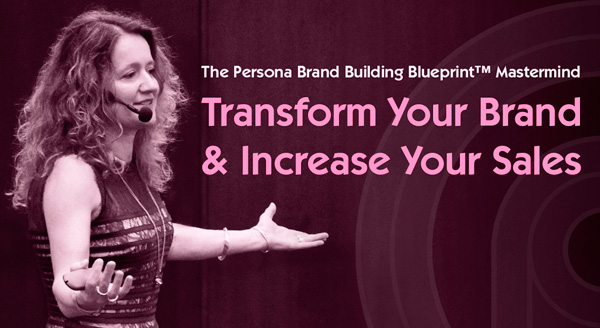
Build your winning brand with The Persona Brand Building Blueprint™ Mastermind here
[1] http://www.marketingcharts.com/online/americans-more-likely-to-share-funny-than-important-content-on-social-media-36502
[2] https://www.marketingweek.com/2016/02/21/good-old-fashioned-advertising-creates-loyal-customers/?nocache=true&adfesuccess=1
[3] http://www.marketingcharts.com/traditional/7-in-10-consumers-believe-funny-ads-spur-better-product-recall-25911
[4] https://hbr.org/2015/11/the-new-science-of-customer-emotions
[5] http://www.marketingcharts.com/online/americans-more-likely-to-share-funny-than-important-content-on-social-media-36502

